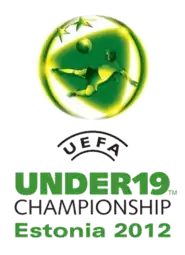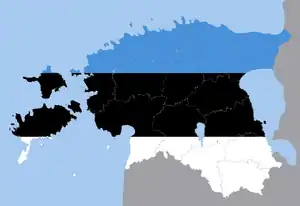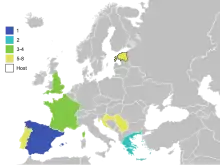| 2012. aasta U-19 Euroopa meistrivõistlused jalgpallis | |
|---|---|
 | |
| Tournament details | |
| Host country | Estonia |
| Dates | 3–15 July |
| Teams | 8 (from 1 confederation) |
| Venue(s) | 4 (in 3 host cities) |
| Final positions | |
| Champions | |
| Runners-up | |
| Tournament statistics | |
| Matches played | 15 |
| Goals scored | 49 (3.27 per match) |
| Attendance | 46,022 (3,068 per match) |
| Top scorer(s) | |
| Best player(s) | |
The 2012 UEFA European Under-19 Championship was the 61st edition of UEFA's European Under-19 Championship (the eleventh since the age competition change to an Under-19 level) and took place in Estonia from 3 to 15 July.[1] Spain were the defending champions. This competition also acted as a qualifying competition for the 2013 FIFA U-20 World Cup, as six sides from Europe qualify.
Players born after 1 January 1993 were eligible to participate in this competition.
Qualification
Qualification for the final tournament occurred in two stages: a qualifying round and an elite round. During these rounds, 51 national teams competed to determine the seven teams that would join the automatically qualified host nation Estonia.
The qualifying round was played between 21 September and 16 November 2011. Liechtenstein did not enter and England, France and Spain received a bye to the elite round as a result of their UEFA ranking coefficient. The remaining 48 teams were divided into 12 groups of four teams, with each group being contested as a mini-tournament hosted by one of the group's teams. After all matches were played, the 12 group winners, 12 group runners-up and the best third-placed team advanced to the elite round.
The elite round was played between 23 and 31 May 2012. The 28 teams entering this phase were split into seven groups of four teams for a further round of mini-tournaments. The seven group winners qualified for the final tournament.
Qualified teams
The following eight teams qualified for the final tournament:
| Country | Qualified as | Previous appearances in final tournament1 only U-19 era (since 2002) |
|---|---|---|
| Hosts | 0 (debut) | |
| Winner of Group 1 | 5 (2003, 2005, 2007, 2009, 2010) | |
| Winner of Group 2 | 6 (2002, 2003, 2005, 2008, 2009, 2010) | |
| Winner of Group 3 | 4 (20052, 2007, 2009, 2011) | |
| Winner of Group 4 | 4 (2003, 2006, 2007, 2010) | |
| Winner of Group 5 | 4 (2005, 2007, 2008, 2011) | |
| Winner of Group 6 | 1 (2010) | |
| Winner of Group 7 | 8 (2002, 2004, 2006, 2007, 2008, 2009, 2010, 2011) |
- 1 Bold indicates champion for that year. Italic indicates host for that year.
Venues
| Stadium | Location | Capacity[2] | Notes[3] |
|---|---|---|---|
| A. Le Coq Arena | Tallinn | 9,692 | Three group games, semifinals and the final |
| Haapsalu linnastaadion | Haapsalu | 869 | Three group matches |
| Kadrioru staadion | Tallinn | 5,000 | Three group matches |
| Rakvere linnastaadion | Rakvere | 2,500 | Three group matches |

Match officials
UEFA named six referees and eight assistant referees for the tournament on 18 June 2012, all who are young and upcoming top referees in Europe. Additionally two Estonian referees were chosen as fourth officials for the group stage matches.[4]
| Country | Referee |
|---|---|
| Kenn Hansen | |
| Paolo Valeri | |
| Vadims Direktorenko | |
| Danny Makkelie | |
| Arnold Hunter | |
| Alain Bieri |
Squads
Results

Group stage
The draw was held on 6 June 2012 in Tallinn, Estonia.[5][6]
Each group winner and runner-up advanced to the semifinals. The top three teams in each group also qualified for the 2013 FIFA U-20 World Cup.
If two or more teams are equal on points on completion of the group matches, the following criteria are applied to determine the rankings.[7]
- Higher number of points obtained in the group matches played among the teams in question
- Superior goal difference from the group matches played among the teams in question
- Higher number of goals scored in the group matches played among the teams in question
- If, after applying criteria 1) to 3) to several teams, two teams still have an equal ranking, the criteria 1) to 3) will be reapplied to determine the ranking of these teams. If this procedure does not lead to a decision, criteria 5) and 7) will apply
- Results of all group matches:
- Superior goal difference
- Higher number of goals scored
- Respect Fair Play ranking of the teams in question
- Drawing of lots
Additionally, if two teams which have the same number of points and the same number of goals scored and conceded play their last group match against each other and are still equal at the end of that match, their final rankings are determined by the penalty shoot-out and not by the criteria listed above. This procedure is applicable only if a ranking of the teams is required to determine the group winner and the runner-up.
| Legend |
|---|
| Advanced to semifinals and qualified for the 2013 U-20 World Cup |
| Qualified for the 2013 U-20 World Cup |
All times are Eastern European Summer Time (UTC+3)
Group A
| Team | Pld | W | D | L | GF | GA | GD | Pts |
|---|---|---|---|---|---|---|---|---|
| 3 | 2 | 1 | 0 | 7 | 4 | +3 | 7 | |
| 3 | 2 | 0 | 1 | 8 | 5 | +3 | 6 | |
| 3 | 1 | 1 | 1 | 8 | 6 | +2 | 4 | |
| 3 | 0 | 0 | 3 | 1 | 9 | −8 | 0 |
Group B
| Team | Pld | W | D | L | GF | GA | GD | Pts |
|---|---|---|---|---|---|---|---|---|
| 3 | 2 | 1 | 0 | 5 | 3 | +2 | 7 | |
| 3 | 2 | 0 | 1 | 5 | 2 | +3 | 6 | |
| 3 | 1 | 1 | 1 | 4 | 2 | +2 | 4 | |
| 3 | 0 | 0 | 3 | 1 | 8 | −7 | 0 |
Knockout stage
Bracket
| Semi-finals | Final | |||||
| 12 July – Tallinn | ||||||
| 3 (4) | ||||||
| 15 July – Tallinn | ||||||
| 3 (2) | ||||||
| 1 | ||||||
| 12 July – Tallinn | ||||||
| 0 | ||||||
| 1 | ||||||
| 2 | ||||||
Semi-finals
Final
|
| ||||||||||||||||||||||||||||||||||||||||||||||||||||||||||||||||||||||||||||||||||||||||||||||||||||||||||||||||||||||||||||||||||||||||||||||||||||||||||||||||||||||||||||||||||||||||||||||||||||||||||||||||||||||||||
| 2012 UEFA U-19 European champions |
|---|
Spain 9th title |
Goalscorers
- 5 goals
- 3 goals
- 2 goals
- 1 goal
- 1 own goal
 Artur Pikk (against Portugal)
Artur Pikk (against Portugal)
Team of the tournament
After the final, the UEFA technical team selected 23 players to integrate the "team of the tournament".[13]
|
|
|
|
References
- ↑ "U19 elite round draw made". UEFA. Retrieved 2 March 2012.
- ↑ "Staadionid" (in Estonian). Estonian Football Association. Retrieved 14 May 2012.
- ↑ "Alanud aasta toob Eestisse jalgpalli suurvõistluse" (in Estonian). Estonian Football Association. 1 January 2012. Retrieved 29 January 2012.
- ↑ "UEFA määras Eestis toimuvale finaalturniirile 16 kohtunikku" (in Estonian). Estonian Football Association. 18 June 2012. Retrieved 19 June 2012.
- ↑ "Millal ja kus peetakse U-19 EM-finaalturniiri mängud?" (in Estonian). Estonian Football Association. 2 April 2012. Retrieved 30 May 2012.
- ↑ Tallinn welcomes U19 contenders UEFA.com
- ↑ "Regulations of the UEFA European Under-19 Championship 2011/12" (PDF).
- 1 2 3 4 "U-19 EM-finaalturniiri külastas avapäeval 11 138 pealtvaatajat" [11,138 people attended the opening day of U19 European Championship] (in Estonian). Estonian Football Association. 4 July 2012. Retrieved 4 July 2012.
- 1 2 3 4 "U-19 EM-finaalturniiri publikuarv ületas 20 000 piiri" [U19 final tournament's attendance number surpassed 20,000] (in Estonian). Estonian Football Association. 7 July 2012. Retrieved 7 July 2012.
- 1 2 3 4 "Alagrupimänge külastas üle 30 000 pealtvaataja" [More than 30,000 people attended group stage matches] (in Estonian). Estonian Football Association. 9 July 2012. Retrieved 9 July 2012.
- 1 2 "Finaali pääsesid Kreeka ja Hispaania" (in Estonian). Estonian Football Association. 12 July 2012. Retrieved 12 July 2012.
- ↑ "Euroopa meistriks tuli Hispaania" (in Estonian). Estonian Football Association. 15 July 2012. Retrieved 16 July 2012.
- ↑ "Technical report" (PDF). UEFA. p. 13. Retrieved 3 April 2018.

